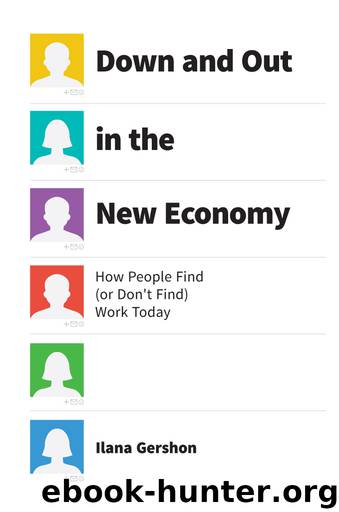Down and Out in the New Economy by Ilana Gershon

Author:Ilana Gershon [Gershon, Ilana]
Language: eng
Format: epub
ISBN: 978-0-226-45228-9
Publisher: University of Chicago Press
Published: 2017-03-23T04:00:00+00:00
Second-Order Information
Part of what people were concerned about is not what was actually said on LinkedIn but what was implied by using LinkedIn in a particular way. When a new medium is introduced, one element that is often up for grabs is how its form affects the message. This was particularly true in job searches. Most of what I have been describing throughout this chapter is anxiety about the second-order information that a message can convey. Second-order information is information that the medium, or form of the message, conveys on top of the actual words or images used in the message, information that changes as the medium’s use changes. For example, a cell phone’s area code can provide information about where someone was living when they first got that cell phone, but this is not the same information as a landline’s area code, which indicates the general geographical location where the phone call is in fact being made. The second-order information you learn from a cell phone’s area code is part of the caller’s geographical history. You can believe that this information indicates quite a bit about someone’s behavior or style of interaction, or you can believe that it indicates very little. You might think that anyone who has lived in New York City talks quickly and drives aggressively. Or you could believe that the only thing that you learn from discovering that someone has a cell phone number with a New York City area code is that they lived in New York City at some point in their life.
Time and time again, I was struck by how often job seekers worried that employers would reject them based on what I considered second-order information—that is, that employers would reject them based not on the actual content of the application but on the form of the message. One example that was occasionally discussed in the workshops I attended was that having an email address with an old domain name such as “aol” or “hotmail” could be grounds for rejection. These domain names supposedly marked an applicant as out of date. Career counselors would recommend having a Gmail account to indicate that you are adopting the more current technology. True, while I heard this advice often enough, I never met anyone who admitted to me that they screened job applicants based on their email account.15 But this anxiety was indicative of how everyone in the process understood that job applications were not only evaluated by what was said; they were also evaluated by the second-order information accompanying the various genres submitted for evaluation. Job evaluators will take aspects of how people are using a medium and what medium they are using as indications of what kind of worker they will be—although I want to stress that they won’t pay attention to the same things or interpret the same second-order information consistently.
I came across plenty of other instances in which hiring managers or HR managers admitted that they screened people for how they used media to communicate.
Download
This site does not store any files on its server. We only index and link to content provided by other sites. Please contact the content providers to delete copyright contents if any and email us, we'll remove relevant links or contents immediately.
The Motivation Myth by Jeff Haden(5212)
Audition by Ryu Murakami(4930)
Adulting by Kelly Williams Brown(4574)
The Confidence Code by Katty Kay(4260)
A Mind For Numbers: How to Excel at Math and Science (Even If You Flunked Algebra) by Barbara Oakley(3307)
Waiting in the Wings by Melissa Brayden(3219)
Self-Esteem by Matthew McKay & Patrick Fanning(3144)
Fooled by Randomness: The Hidden Role of Chance in Life and in the Markets by Nassim Nicholas Taleb(3124)
The ONE Thing by Gary Keller(3071)
Nice Girls Don't Get the Corner Office by Lois P. Frankel(3044)
The Dictionary of Body Language by Joe Navarro(2996)
How to be More Interesting by Edward De Bono(2791)
Designing Your Life by Bill Burnett(2746)
Getting Things Done by David Allen(2700)
The Plant Paradox by Dr. Steven R. Gundry M.D(2620)
Police Exams Prep 2018-2019 by Kaplan Test Prep(2548)
What Color Is Your Parachute? 2015 by Richard N. Bolles(2311)
Dangerous Personalities by Joe Navarro(2289)
When to Jump by Mike Lewis(2241)
